
As we find ourselves in an era where the cosmos is not just a dream but a destination, space tourism is rapidly becoming an attainable reality. Our fascination with the stars and the vast universe is leading us to seek experiences beyond Earth’s atmosphere. At SpaceVoyageVentures.com, we document the evolving landscape of space tourism, offering insights into the journeys that are currently available, those on the cusp of availability, and visionary aspirations for the future. From suborbital jaunts to orbital vacations, the potential for space exploration is no longer limited to astronauts and cosmonauts.

When considering such an extraordinary adventure, planning becomes crucial. Preparing for a space journey requires understanding the nuances of space tourism, from selecting the right space experience that aligns with your cosmic aspirations to the crucial legal and safety considerations. Booking your passage to the stars entails not just securing a ticket but also attuning to the physical and mental demands of space travel. We’re here to guide you through making informed decisions, ensuring your galactic getaway is as breathtaking and awe-inspiring as the universe itself.
Navigating the practical elements of space tourism, like exclusive accommodations and the environmental impact of your journey, is essential. At our core, we strive to provide all the necessary information to capture your space travel memories responsibly and sustainably. Through SpaceVoyageVentures.com, you can access a wealth of information to help you share your out-of-this-world experience with others and remain engaged with the space tourism community upon your return.
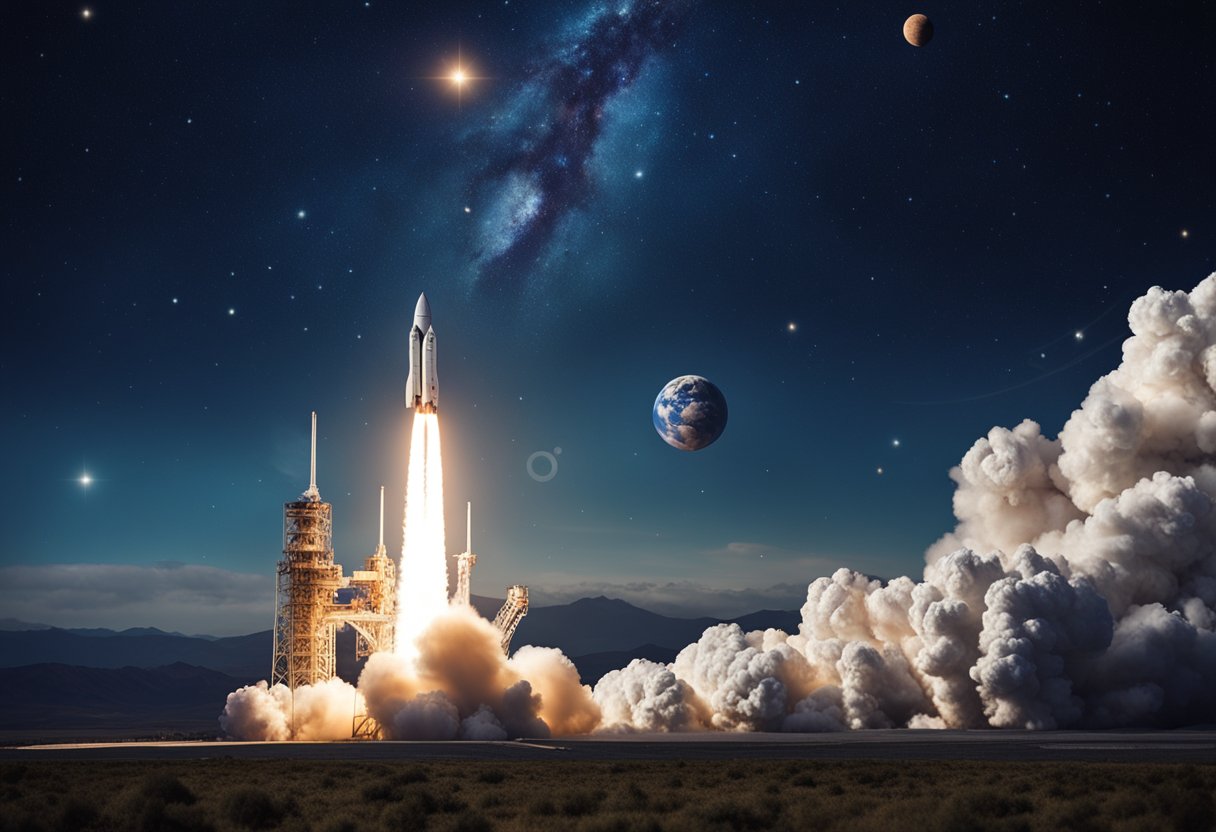
Space tourism is an emerging sector of travel where private citizens experience human spaceflight. Unlike traditional astronauts affiliated with government-run agencies like NASA or Roscosmos, these participants, often called private astronauts, embark on space adventures as paying customers.
Commercial space travel differs from historical space exploration, which focused on scientific research and national prestige. The Apollo 11 mission that took humanity to the Moon in 1969 was a landmark in exploration but quite different from today’s commercial ventures. In contrast, contemporary space tourism is geared more towards experience and personal fulfilment.
Typically, space tourism encompasses both suborbital and orbital flights, with suborbital options being more accessible at present. While suborbital flights offer a few minutes of weightlessness and a view of the Earth’s curvature, orbital flights are longer and provide a more comprehensive experience of living in space.
The progress in private spaceflight owes much to technological advancements and the entry of private companies into the space sector. Notable players include SpaceX, Blue Origin, and Virgin Galactic, each working to make commercial spaceflights a regular occurrence.
At SpaceVoyageVentures.com, we document the past, present, and future of space exploration. Here, enthusiasts can learn about available trips, ones on the horizon, and dream of possibilities that lie ahead. Our engagement in space tourism reflects our belief in its potential to grow and provide unparalleled experiences.
| Space Tourism Type | Experience Offered |
|---|---|
| Suborbital | Brief weightlessness |
| Orbital | Extended space experience |
In summary, our collective ambition for space exploration has evolved. What was once reserved for a select few trained astronauts is gradually becoming available for more of us, heralding a new era in human discovery and adventure.

Space tourism reached a historic milestone with the Apollo 11 moon landing in 1969, under the aegis of NASA. This mission set the stage for humanity’s quest into space exploration. We’ve witnessed a significant transition from purely government-led space missions to the inclusion of private players and tourists in the space domain.
Key Events in Space Tourism:
Progression in Space Tourism Opportunities:
At SpaceVoyageVentures.com, we’ve catalogued potential future trips, alongside those already available or nearly available, charting the evolution from aspiration to actuality.
Current Choices for Aspiring Space Tourists:
In summary, every milestone we achieved has paved the way for greater advancements in space tourism, and we’re dedicated to tracking this exciting journey for enthusiasts eager to experience the final frontier firsthand.

When we consider booking a space adventure, it’s essential to thoroughly assess the companies offering these journeys and compare the types of spacecraft that will take us beyond Earth’s atmosphere.
In the nascent industry of space tourism, several pioneering companies are making headlines. SpaceX has demonstrated its capability with successful orbital missions and plans for private citizen trips around the Moon. Likewise, Virgin Galactic is advancing suborbital space flights for tourists, offering a taste of weightlessness and stunning views of Earth. Then there’s Blue Origin, which has also successfully launched its New Shepard suborbital vehicle with passengers aboard. As we consider our options, examining their safety records, customer experiences, and mission success rates is vital. For a more extensive overview of what future trips might be available, SpaceVoyageVentures.com is a burgeoning hub for space tourism updates.
The type of spacecraft plays a pivotal role in our space travel experience. SpaceX’s Crew Dragon is a fully autonomous, orbital-class spacecraft designed for long-duration space travel. On the other hand, Virgin Galactic’s SpaceShipTwo operates as a spaceplane, gliding back to Earth after reaching the edge of space. Blue Origin’s New Shepard is a rocket system meant for short suborbital trips, offering a brief but no less thrilling experience. We must compare factors like cabin size, flight duration, and onboard amenities to align with our expectations of a space adventure. Each spacecraft brings a unique experience, from the depth of space explored to the level of comfort provided.
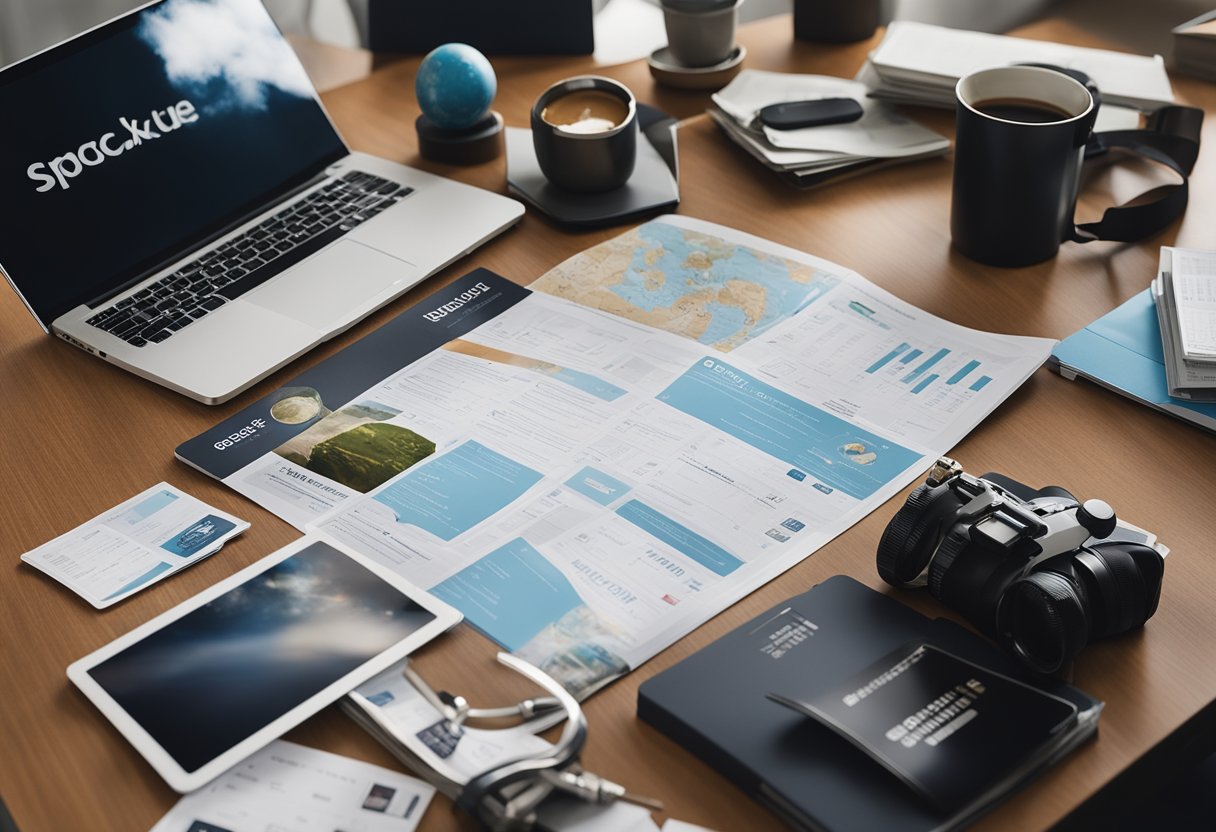
Embarking on a space adventure requires meticulous planning and comprehensive training. It’s essential for us to ensure our physical and mental readiness, alongside necessary training and practice, to tackle the unique challenges of space travel.
Space travel is an extraordinary endeavour that demands both physical fitness and mental resilience. We must maintain optimal health and undergo regular medical evaluations. Addressing potential health concerns and adhering to a fitness regimen tailored for space travel are of paramount importance. Psychological steadiness will be our anchor in an unfamiliar environment, where coping mechanisms and mental fortitude will be tested.
Educating ourselves on the workings of spacecraft and familiarising with zero-gravity conditions takes precedence in our training. We must undertake simulated exercises that replicate space conditions. This practice enables us to acclimate to the sensations and challenges of a microgravity environment, ensuring we are not taken by surprise.
Participation in educational programmes offered by SpaceVoyageVentures.com allows us to gain a comprehensive understanding of our upcoming journey, from the physics governing spaceflight to emergency protocols. These preparations go beyond the physical; they prepare our minds for the voyage ahead, fostering confidence in our ability to face the final frontier.

We’re on the brink of a new era where commercial space travel transforms from science fiction into reality. Embarking on space adventures is no longer limited to astronauts; now it’s a breathtaking possibility for us too. In this section, we’ll guide you through the crucial steps to secure your place among the stars.
When we consider the realm of space adventures, it’s imperative to grasp the variety of ticketing options available for our escapades beyond Earth. Commercial space travel companies have started offering diverse adventure tours, each with its own unique set of experiences and price points.
Suborbital Flights: Brief journeys that take us just beyond the Kármán line – the edge of space – before returning to Earth. These are typically shorter trips, lasting a few minutes in zero-gravity conditions.
Orbital Flights: More extensive missions that involve orbiting the Earth. These can last from several hours to days, offering us a more immersive experience.
Ticket acquisition can seem daunting, but numerous providers now streamline the process. Companies like SpaceVoyageVentures.com offer in-depth insights into upcoming opportunities and tickets for both suborbital and orbital flights. With options ranging from single seats on shared expeditions to private capsule bookings, we can choose the adventure that resonates most with us.
As we set our sights on the stars, it’s essential to stay informed and select a reputable provider. Our tickets are not merely passes for travel; they are keys to unlocking one of the most exclusive experiences humanity has to offer. Whether it’s gazing at the stars from an unprecedented vantage point or feeling the thrill of weightlessness, the adventure awaits us.

Space tourism has entered a new era of luxury with offerings that include state-of-the-art amenities and accommodations out of this world. We’re taking a closer look at the opulent experiences you can expect when booking a space adventure.
When you embark on a private spaceflight, expect no less than the pinnacle of luxury. Seats on spaceships from pioneers like Virgin Galactic are not just a ticket to the stars but also a pass to premium services. From exquisite meals crafted by renowned chefs to suit your zero-gravity needs to personalised training and concierge services, every detail is meticulously designed for an exclusive and comfortable journey.
The concept of a space hotel is no longer in the realm of science fiction. We’re talking about actual modules attached to space stations, where you can enjoy the comforts of well-appointed living quarters. These accommodations are expected to feature panoramic space views, thoughtfully designed for both privacy and socialising. While the idea is currently being developed, our website SpaceVoyageVentures.com keeps you informed about these forthcoming stellar destinations.

When planning for the thrill of a lifetime with a journey to space, it’s vital to be aware of the various legal and safety considerations to ensure a secure and compliant trip. Our focus in this section is on the necessity of health and liability insurance for space adventurers.
We must stress that space tourism is not just an exhilarating experience but also one that comes with its unique risks. Accordingly, health and liability insurance play a pivotal role in your space adventure booking.
Health Insurance: It’s imperative to secure a specialised health insurance plan that covers the inherent risks of space travel. This includes exposure to high G-forces and cosmic radiation. Evaluate policies that cater to the peculiarities of spaceflight and ensure they provide comprehensive coverage.
Liability Insurance: We advise obtaining liability insurance to safeguard against potential claims that might arise from damages incurred during the spaceflight. Travellers should understand the terms and conditions of their policy, ensuring it addresses the complexities of space tourism.
Importantly, the insurance industry is adapting to the emerging demands of space travel. As the sector grows, prompted by the efforts of platforms like SpaceVoyageVentures.com, travellers should keep abreast of evolving regulations and insurance products. Remember, safety in space tourism is paramount, and regulations are in place to protect us. These legislations help guide companies to meet safety standards, and the involvement of entities such as the Federal Aviation Administration is essential to maintain those standards.
Make sure that you are fully versed with all the requirements and have taken the necessary steps to comply. A safe and memorable space experience is one that is meticulously planned, with all legal and safety protocols closely followed.

Embarking on a space journey represents a pinnacle of human achievement and a dream for many. Preserving the memories of this unparalleled adventure is as significant as the trip itself.
Space offers visuals that are profoundly different from anything we encounter on Earth. When capturing photographs in the vacuum of space, it’s essential to consider the extreme contrasts and lack of atmosphere which can affect exposure and colour balance. Instagram has transformed into a digital scrapbook, where adventurers can instantly share their experiences with the world. Prepare to capture videos that encompass the vastness of space and the intimacy of the human element within the spacecraft.
Uploading content to social media, like Instagram, allows followers to partake in our journey, offering a glimpse into the mesmerising views and emotions that come with travelling beyond our planet. It’s vital to plan the logistics around camera equipment, storage, and power supply so that every moment can be preserved without technical hitches.
Our personal devices, equipped to handle the unique conditions of space, can document these buoyant moments. Whether it’s capturing the earthrise, recording zero-gravity antics, or simply expressing our feelings to the camera, we embrace each opportunity to encapsulate our journey. Remember, space tourism is not just about the destination, but also about the story we bring back. While SpaceVoyageVentures.com maps out our potential travel plans, our personal cache of images and videos builds a narrative of a lifetime.
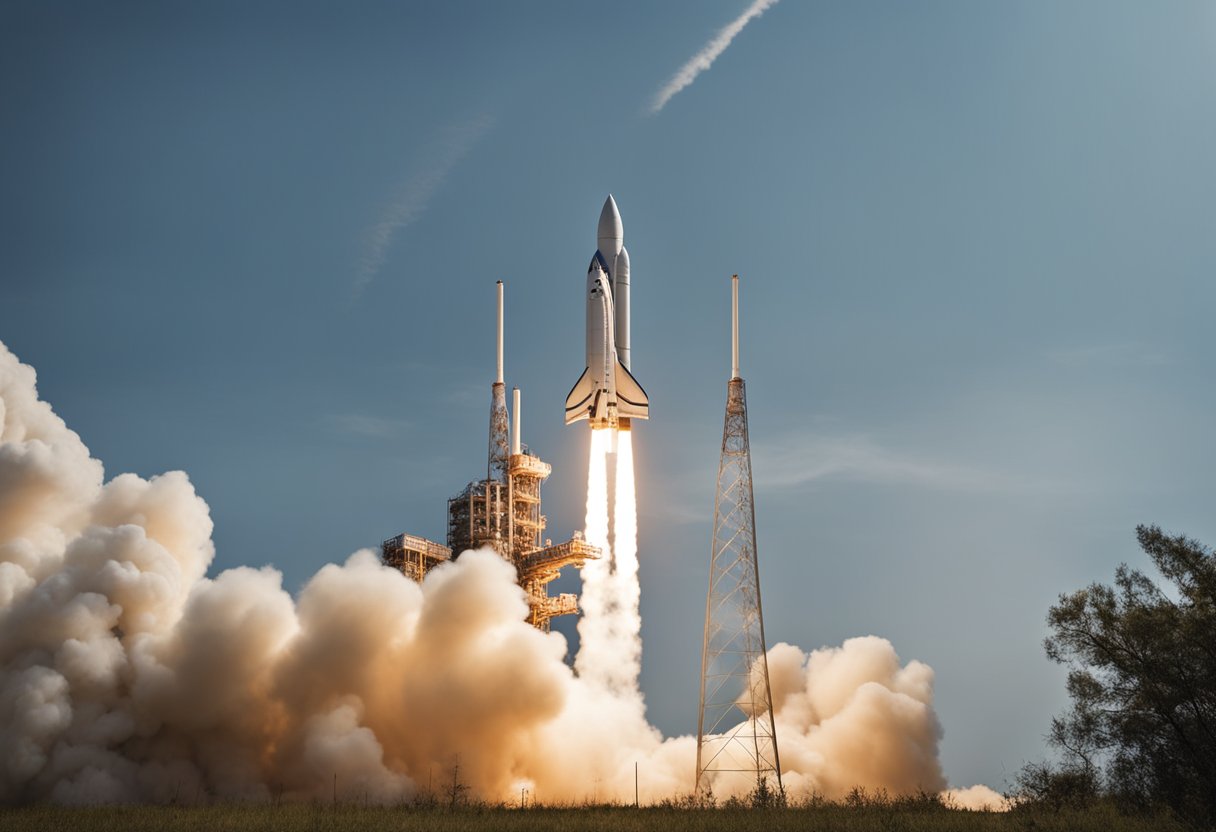
Space tourism is an exciting prospect that offers a glimpse into what many of us have only dreamed about. However, we must consider the environmental impact associated with this fledgeling industry. Our focus here is on the ways in which space tourism contributes to pollution and affects the broader environment.
Emissions: Rocket launches emit various gases and particulate matter into the Earth’s atmosphere. Notably, hybrid rocket motors, such as those utilised by some space tourism companies, release a substantial amount of soot into the stratosphere. This can potentially contribute to atmospheric changes and affect climatic patterns.
Chemical Pollution: The fuel burnt during these launches—often a mix of synthetic rubbers and liquid oxidisers—produces chemicals that may be detrimental to the environment. For example, nitrous oxide, a common oxidiser, has notable implications on both ozone layer depletion and as a potent greenhouse gas.
Frequency of Launches: As space tourism grows in popularity, the number of launches is expected to increase, escalating the cumulative effect on the environment. Explore SpaceVoyageVentures.com to understand our potential space tourism trajectories and how they might amplify these environmental challenges.
Stratosphere Protection:
We’re committed to continuing the dialogue on how to balance humanity’s aspirations for space adventure with our responsibility to protect Earth’s environment. It’s crucial we find sustainable practices that allow us to explore the cosmos without causing irreparable damage to our home planet.

After returning from our journey beyond the Earth’s atmosphere, we possess a unique perspective and wealth of knowledge that can inspire and educate others.
Once our space adventure has reached its conclusion, we have the chance to become ambassadors of space tourism. This role allows us to convey the profound experience we’ve gained and disseminate the education we’ve absorbed throughout our adventure. Armed with firsthand insights, we can share revelations about our travels with SpaceVoyageVentures.com, a platform dedicated to the curation and enlightenment of future space tourism enthusiasts.
Our narratives serve not only as a beacon for aspiring astronauts but also as a critical tool to foster public understanding and enthusiasm. By communicating the impacts of space travel on our worldview and the scientific knowledge we have gained, we encourage a wider conversation about space exploration’s future and the potential it holds for humanity.
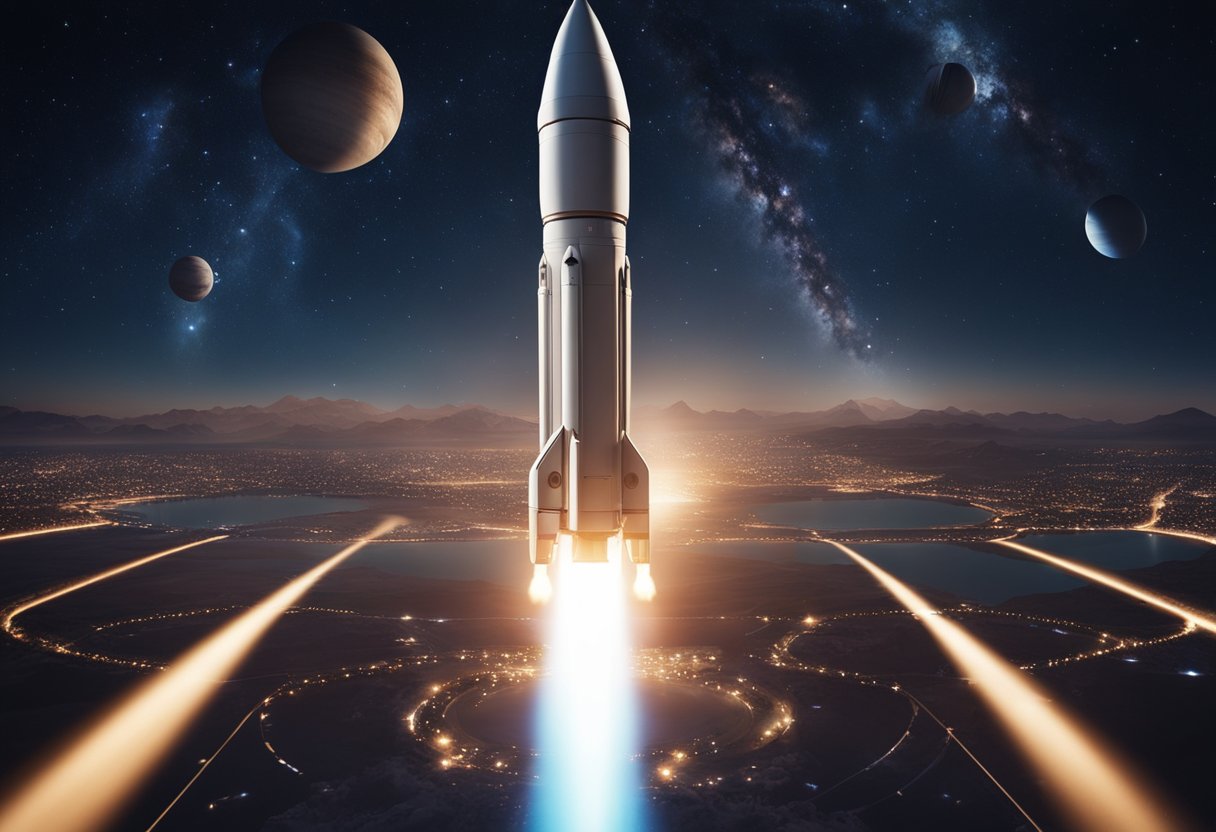
For those keen to keep an ear to the ground in the burgeoning sector of space tourism, engaging with dedicated communities is essential. These platforms offer insights into NASA-led endeavours, civilian astronaut experiences, and emerging space tourism opportunities.
We recommend joining space tourism communities to stay updated with the latest news, advancements, and discussions. Sites like SpaceVoyageVentures.com act as repositories for both hypothesised and soon-to-be-realised space tourism ventures. Here’s how to maximise your involvement:
Follow Reputable Forums: Seek out forums and online platforms that discuss the intricacies of space tourism. These online communities are often frequented by industry experts and enthusiasts alike.
Sign Up for Newsletters: Newsletters from trusted sources can keep you informed about NASA’s projects and initiatives that may impact the future of space tourism.
Attend Events: Keep an eye out for public talks, webinars, or conferences that focus on space exploration and tourism. Attendance can enhance your understanding and may provide networking opportunities.
Participate in Discussions: Actively partaking in discussions allows for the exchange of ideas and can lead to a deeper understanding of what being an astronaut involves.
Monitor Progress of Ventures: Websites document not only what’s currently available in terms of space excursions but also what we can anticipate in the near future. Regularly checking these can provide a sense of the field’s trajectory.
By immersing ourselves in these communities, we not only support the industry but also ensure we are among the first to know of exciting developments and ready when the opportunity to embark on a space adventure presents itself.
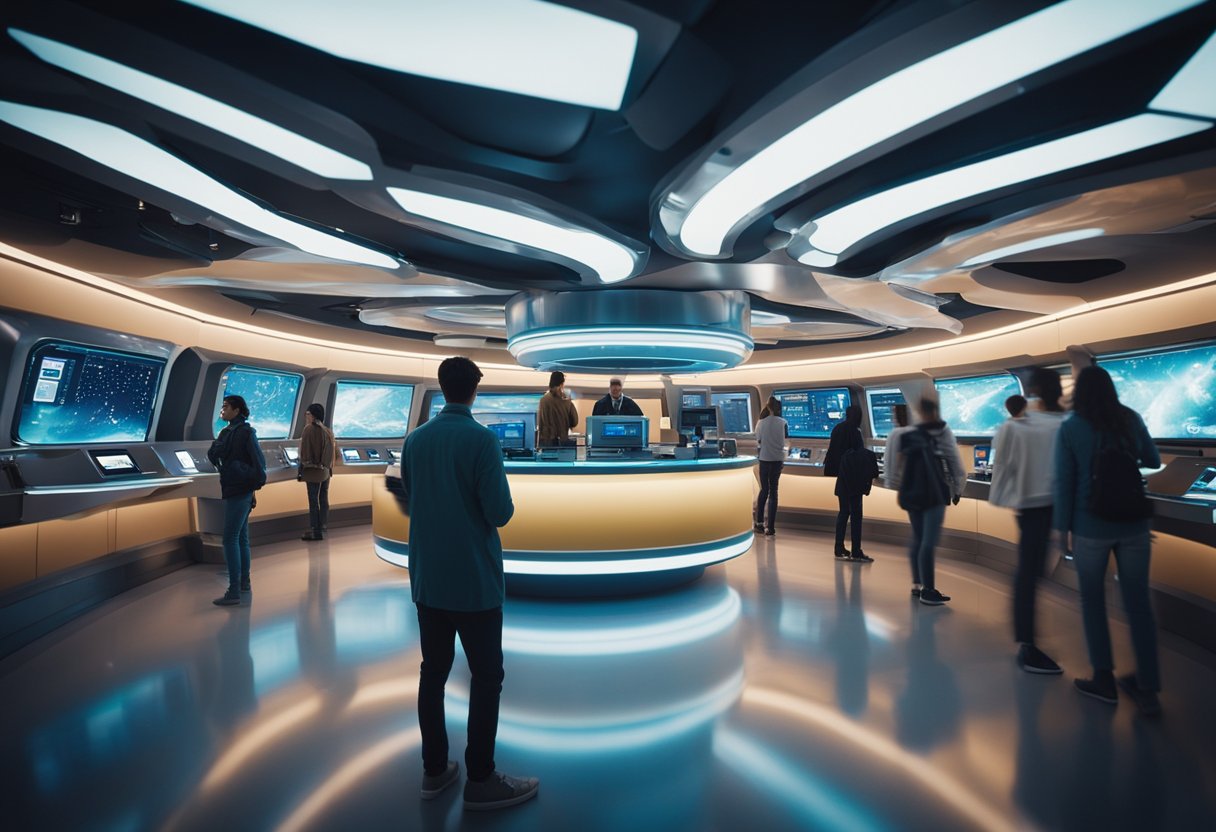
As experts in space tourism, we’re here to guide aspiring astronauts through the essential considerations and preparations for their extraterrestrial odyssey.
Before embarking on a space adventure, one must assess their physical fitness, understand the risks involved, and review the duration and itinerary of the voyage. Researching through informative platforms like SpaceVoyageVentures.com can provide valuable insights into what to expect.
Preparation for space travel involves rigorous training to withstand G-forces, sessions on simulators to get accustomed to zero-gravity environments, and psychological readiness. Prospective space travellers may also consider preliminary flights to experience reduced gravity before the actual space trip.
Participating in space tourism commands a high financial investment, often running into hundreds of thousands to millions of dollars. It’s vital to explore various pricing options and additional costs, such as training and gear, to fully grasp the economic impact of your journey.
Currently, choices in space tourism range from suborbital flights to orbital expeditions and even proposed lunar trips. Companies like SpaceX, Blue Origin, and Virgin Galactic offer varying experiences, which you can investigate to determine the best fit for your aspirations and budget.
Space travel is expected to become more accessible with advancements in technology leading to reductions in cost. We might witness the establishment of space hotels, longer missions, and even commercial flights to the Moon or Mars.
The experience and cost can vary significantly among providers, with some offering brief suborbital flights and others providing more extended stays in space. Investigating customer feedback and cost breakdowns from trusted sources can shed light on what differentiates each company in the burgeoning space tourism sector.